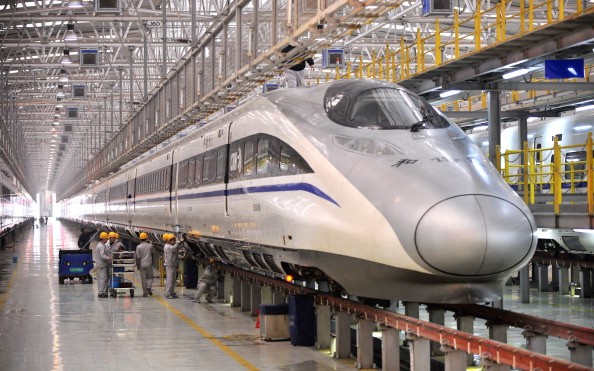Two Chinese high-speed trains "Golden Phoenix" and "Dolphin Blue" entered the world record books on Friday morning for successfully passing each other on parallel tracks at 420 km per hour in central China.
The "China-standard" trains, officially known as electric multiple unit (EMU) trains, are the first in the world to cross at such a high speed, Zhou Li, head of technological management at the state-owned China Railway Corporation, told the Xinhua News Agency.
The gap between the two trains was only 1.6 meters when they met and the passengers, composed mainly of technicians and journalists, felt only slight jolts during the encounter at the border between Henan Province and Jiangsu Province.. At a relative speed to one another of 840 km per hour, the trains are effectively travelling at the same speed as a cruising airliner, according to Xinhua.
The event is also notable for the fact that Golden Phoenix and Dolphin Blue are two trains coupled together - different models manufactured by different companies - that are both subsidized by China Railway Rolling Stock Corporation (CRRC).
Coupling such trains is a technological challenge, involving synchronized pulling, braking, and other key factors, said Zhao Hongwei, chief researcher at the China Academy of Railway Sciences
China began working on EMU trains in 2012 and unveiled its first working EMU unit to the public in 2015. Today, the country operates an EMU fleet of 2,395 trains, the world's largest, and maintains approximately 19,000 km of high-speed track - representing 60 percent of the global total.
The success of the test displays China's expertise on the core technology needed for high-speed EMUs, Zhou told Xinhua, adding that it would help improve the branding and marketing of Chinese high-speed trains to the foreign market.
The trains can be adapted to suit various geological and operational situations, including extreme climates, which is a core competitive strength in the global market, Zhou said.
China-made bullet trains are already being operated overseas, including those in Indonesia, Russia, Iran and India.
In 2014, the China Railway International Group was established to find potential partners for railway projects in Malaysia, Singapore, the United States, the United Kingdom, and Africa.



























